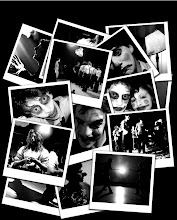Earlier this week Dominic and Jethro were featured in the Dear John advice column in The Stage.
Asked for advice on how to adapt an epic story onto the small stage:
DOMINIC
 J ALLEN
J ALLEN You can't underestimate an audience's ability to suspend their disbelief. It's the theatre-makers most useful tool in reducing the scale of a play; you can have a multi-million pound set and a cast of hundreds but if you don't have a compelling drama that encompasses those epic themes, then you haven't got a play anyway. Once you've satisfied the play's basic requirements, anything extra is probably superfluous. Even when you can't do that there are still ways around it.
In Lorca is Dead, for instance, there are many plays within plays and because the audience are willing to suspend their disbelief, you can get around the vast number of characters through meta-theatricality and getting the audience to play parts. One could argue it undermines the themes and storyline; in fact I would say that it merely changes the way the audience connect with them. Once an audience becomes involved that directly with a storyline, they may miss the occasional subtle bit of plot but they will then have a vested interest in the outcomes for the characters on stage.
Establishing 'the rules' early on in the play helps in getting the audience to come along on the journey. In Lorca is Dead, anybody can play Lorca – but he needed to be clearly identified. A complete costume change was out of the question, so we boiled it down to a simple red scarf. The scarf is set up as a symbol for Lorca as soon as he gets mentioned, and that's all that's required. If the principles are established early on, the audience's collective imagination will do the rest of the work as you go along.
Ultimately, reducing the scale of a show but keeping its power comes down to making logical choices. The simplest solution is often the best. When you can't do something the way you'd like, find a way you can and make it work to the same effect. In Lorca is Dead we wanted Lorca to be everyone's main connection to the play without casting someone as Lorca; the most logical, simplest solution was to get everyone to play him. The result is that when he finally dies, the tragedy hits home especially hard for the audience members who are sitting saying to their friend: “That's me up there...”
JETHRO COMPTON
Epic stories are something that link all of our shows; we’re a company with storytelling right at our heart. I’d always loved the imagery of the Hunchback swinging from the towers of Notre Dame. Obviously that’s something that’s not going to transfer to a small stage very easily. For me ‘Quasimodo’ is more about the story surrounding the four characters, and it’s simple enough.
Rather than tackling the politics and Parisian architecture that are so important in Hugo’s novel, I’ve concentrated on the characters right at the centre of it. I’ve told only a small part of the story, the part that I found most interesting. To try and present every inch of the novel onstage or even just to try and cover all the themes would be disastrous. The themes that ‘Quasimodo’ takes from the novel are ones that relate and transfer most easily to a modern audience. The show is what’s left once the epic story of the novel has been and stripped back to its core. ‘Quasimodo’ presents the themes of ‘Notre Dame de Paris’, it presents its essence and hopefully captures the power of Hugo’s story. It’s the story of a boy in love with a girl, and the girl doesn’t love him back. I think that’s something everyone can relate to.
So if you’re working from a source text, something epic, I guess it’s important to find something at its heart that is more practical, more accessible and use that as your starting point. Don’t get weighed down by the size of the whole thing, just start with something small and manageable, the epic story will always be there in essence.



No comments:
Post a Comment